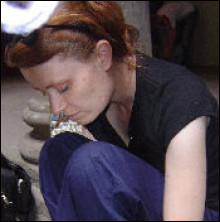 Mi mostri le ferite, da soldato
Mi mostri le ferite, da soldato
la tua battaglia
contro un’altra te che ti consuma
negli occhi, nelle ossa
nella pelle
che ha tagliato i tuoi tendini da tempo,
il filo tutto interno che ti tiene,
palombaro che più non risale.
fogli di carta o fili d’erba
che basta un solo tocco
ed è già sangue:
le tue parole
dritte ai punti morti
al luoghi in ombra
sottili e silenziose come aghi,
mi trovo ricoperta
e non sapevo.
vuoi passare
tra i rami –
che si impigliano
ciglia, che si
scheggiano
gambe,
per specchiarti
nella mia pelle –
sapone, che ti
lavi di
crepe, angoli e ore,
per succhiarmi l'acqua
di luce dall'
occhio.
After having studied and taught for several years in the United States, Elisa Biagini now lives in Florence. Her poetry which she writes in both Italian and English, has appeared in anthologies as well as in various Italian and American journals such as Poesia, Linea d’ombra, Atelier, and Rattapallax. A translator from English (of Alicia Ostriker, Sharon Olds, Lucile Clifton amongst others), she recently also published an anthology of contemporary American poetry. Biagini, one of the most esteemed voices in recent Italian poetry, is certainly one of the most well-defined and recognisable personalities among the new generation of poets.
Biagini’s poetry depicts a domestic, almost everyday world which is also powerfully metaphorical and contained within the limits of a house or a room. In this narrow world, existence becomes contracted and distorted until it is reduced to fragments of the body, revealing gestures, daily objects, and private obsessions, all of which reveal our crude perception of the disaster of human relationships, or the malaise of daily life.
In the metaphorical world of Elisa Biagini’s poetry, bodies transform into new and unexpected elements, visions become deformed sensations, and the laborious search for meaning becomes absolute bewilderment. The body is at the very centre of everything, and everything that takes place under the skin becomes a metaphor and transfiguration of existence. The end result is a ruthless analysis of living, characterized by a chilling disenchantment. In this harsh, disconcerting conception, the organic fuses with the inorganic, the unearthing of sensations with an autopsy, and food becomes one with the carnal and intimate transmission of moods and emotions.
The body as dramatic and merciless protagonist already appeared in the ‘Morgue’ series of poems (1998) – present among the texts selected here – and inspired by Andres Serrano’s photographs of cadavers. Marco Simonelli writes that, in these crude and stinging images, “Elisa Biagini’s writing penetrates into the bodies and gives each one a history, a face, a final and decisive sensation that determines the limit, that mends the violently torn skin. It is a short and complex work in which the author operates on the text like a pathologist performing an autopsy: she cuts and sews up the limbs, she explores the wounds, she traces and takes note of the causes of death with the help of images that are as simple as they are effective.”
Elisa Biagini’s poetic language is hard, dry and essential; it is also elliptical, but never obscure. It coalesces into a real world which is not at all consolatory, but which alternates violent, hard and merciless tones with melancholy ones, because – as Biagini herself affirms – “Writing poetry means forcing yourself to rediscover (and to cause to rediscover) reality, to pause for a longer time in front of things, to hear their inner noise.”
http://www.poetryinternationalweb.net/pi/site/home/index/nl